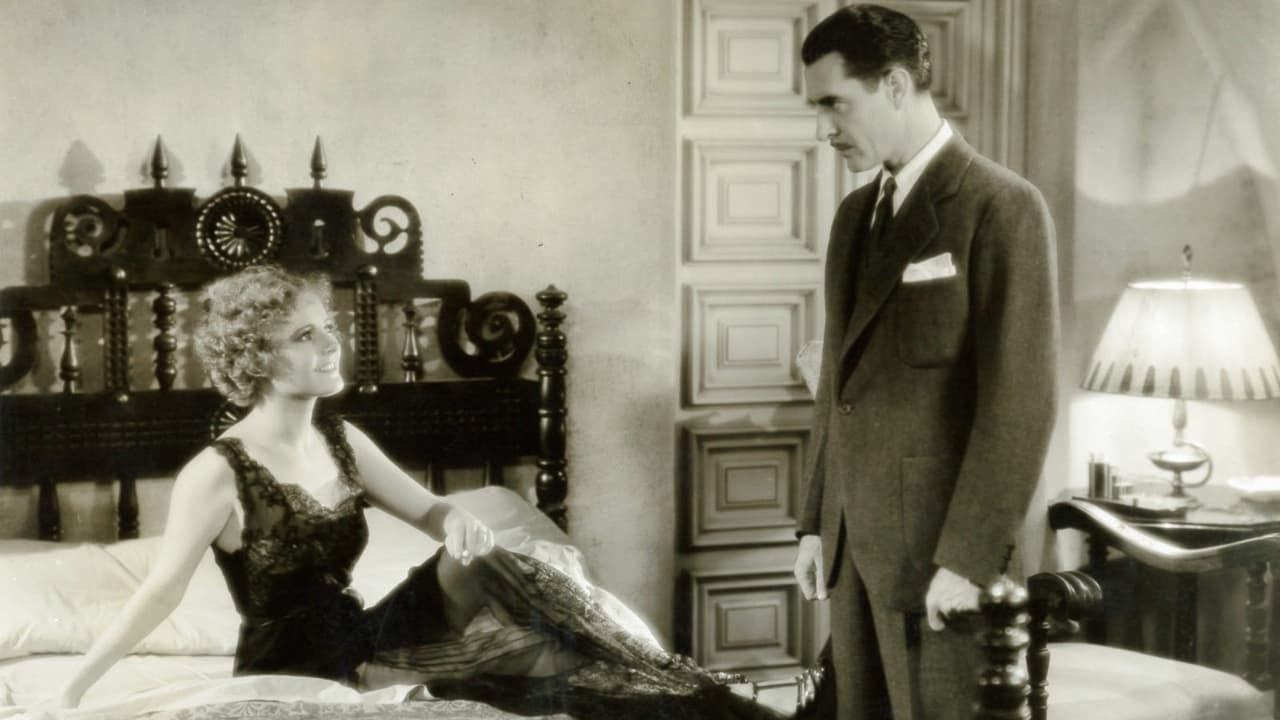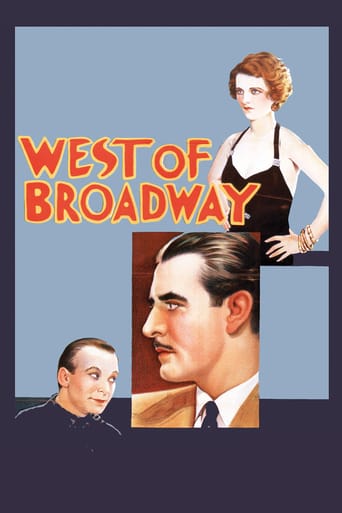Sexyloutak
Absolutely the worst movie.
Freaktana
A Major Disappointment
Aiden Melton
The storyline feels a little thin and moth-eaten in parts but this sequel is plenty of fun.
Stephanie
There is, somehow, an interesting story here, as well as some good acting. There are also some good scenes
lshelhamer
This picture features John Gilbert who appears to have suffered Post Traumatic Stress Disorder from WWI, and then marries Lois Moran on the rebound while drunk. She then pursues him across the US to prove she really loves him. El Brendel, "Swedish", not Hispanic as you might suppose from the name, is featured as ethnic comic relief. Perhaps more interesting for latter day viewers is the question of what was so charismatic about John Gilbert to silent screen audiences. While his acting (and voice) is adequate, it's certainly not outstanding, and while handsome, his appearance is leading-man ordinary (does anyone else think his nose is too big when seen in profile?).
drednm
You get the feeling this might have been a bigger picture. The tacked on ending ruins the preceding hour, which showcases John Gilbert, the great romantic idol of silent films. Certainly one of the most controversial figures of the dawn of talkies. Gilbert's great career crashed fast and fatally. His voice was fine, and he was a terrific actor. But he was never able to recover from the debacle of his starring talkie debut in His Glorious Night. Despite terrific performances in Downstairs and Queen Christina (with Greta Garbo) Gilbert made no headway as the 30s moved along. Several of his talkies were downright awful, but West of Broadway isn't bad at all despite the hacked up ending. Gilbert plays a cad who gets married to a woman because his fiancée jilts him. He then spends the rest of the movie trying to unload her. Lois Moran is quite good as the unwanted wife; Madge Evans is the snooty fiancée. El Brendel (playing his usual fake Swede) and Willie Fung as the Arizona houseboy have a funny scene trying to understand each other. Hedda Hopper, Ralph Bellamy, and Frank Conroy co-star. Gilbert was married to stage actress Ina Claire, who happened to be my grandfather's cousin, so I've always felt a connection to John Gilbert. What a tragedy. He should have been as big a star in talkies as he was in silent films.
max von meyerling
One of the great controversies in cinema history is the fall of the greatest male Hollywood star of the silent era, John Gilbert. Since the old suspicion, that it was merely his voice being too high pitched for the microphone, was definitely disproved when scrutinized several decades ago, the question since has been: Did he jump or was he pushed? It took more than one nail in his coffin to bury John Gilbert's career. WEST OF Broadway was certainly one of the nails. The question becomes: was the incompetence of WEST OF Broadway deliberate and one of a series of career sabotaging moves made by Louis B. Meyer, or was this just another run of the mill bad movie put out during the changeover to sound. It has been pointed out that one surefire way to wreck a career, or least pound one nail in the coffin, would be to have Lionel Barrymore direct your picture. He was that bad a director and he directed Gilbert's disastrous first talkie, HIS GLORIOUS NIGHT. The question is would Meyer have deliberately wrecked his own property as revenge on a man who hit him and knocked him down? And while we know the studios had the knowledge of how to build a personality into a star (witness the careful grooming at this time of Clark Gable by Irving Thalberg) were they knowledgeable enough to destroy one deliberately?The facts about WEST OF Broadway aren't very pretty. The director was veteran, top drawer hack Harry Beaumont. Though Gilbert's reputation was made as the great lover, idolized by millions of women, the main character of WEST OF Broadway, Jerry Seevers, is a bitter and disagreeable man who accidentally marries a woman who loves him and he spends the whole film insulting, rejecting and abusing the woman who comes back for more with a sweet smile on her face. He is cold, cruel and hurtful. Women seeing this, however the denouement is engineered to a happy ending, would have to be turned off. Instead of worshiping Gilbert, women could but despise him. The fact that Seevers is a war hero just sucks all of the life out of Gilbert's great triumph in THE BIG PARADE (still the best war movie ever made). While destroying one Gilbert legend WEST feeds into a new Gilbert legend, that of the self destructive drunkard. Besides being a cold bastard in this picture he is also a nasty drunk. Not a pretty picture. When we finally do get to the ending and the fade out clinch we don't actually get to see the great lover do his stuff. Instead the camera tilts down to capture a piece a business with their feet and legs. This would have been a super cute ending in a light hearted Lubitsch picture but as this picture deals in alcoholism, prostitution, divorce and infidelity it may not be such a good idea. Not showing the great lover actually planting one on sweet pretty little Lois Moran was not a good career move. Meyer couldn't have concocted a better career snuffer than WEST OF Broadway if he tried. The only nagging suspicion is that he did try. No one can prove anything one way or the other but speculation will go one until proof is found one day. On the other hand WEST OF Broadway is beautifully photographed and the bloodlines of the scriptwriters suggest a project that had been considered as a top picture but whose plot problems couldn't be solved and had been reduced in importance to a 68 minute programmer and unloaded on Gilbert. The plot is rather perfunctorily disposed of all too quickly moving from New York to Arizona and back again. No effort, not the slightest effort, is made to establish any period ambiance. Pre prohibition 1919 is virtually identical to the 1931 of the picture's release including an anachronistic reference to flying from Chicago. WEST OF Broadway was something of a showcase for newcomer Ralph Bellamy who, unlike Gable, didn't catch on as a star. The studios had a method in all this madness. MGM was certainly careful not to allow any of their more valuable properties - e.g. Harlow, Crawford, Sherer etc. near the sinking S.S. Gilbert. Gilbert may have been too oblivious from drink to notice or care at this point but more likely the ego inherent in every actor would have been stimulated to assay a role of a bitter, self destructive man with the DT's so he probably actively participated in his own eclipse as a star.WEST OF Broadway is interesting today because it's another station on John Gilbert's Via Delarosa and is a typical example of the brief pre-code period of Hollywood openness, an openness which would soon close up not to be returned to until the 1960's.
Arthur Hausner
I'm always leery about a plot that begins with a drunk marrying a girl for almost no reason, only to find out the next day what a mistake it was. And the plot gets worse as people seem to behave without reason. I couldn't believe a minute of the film. (Preview audiences laughed at the goings on.) Still, it is a good film to watch if only to dispel any myths about Gilbert's voice being the cause of his demise as a star in the sound era. His voice is not high-pitched or squeaky (which I had heard) but is rather strong, low-pitched and quite good. You could see he still was an excellent actor. Beautiful Lois Moran was excellent as Gilbert's co-star; I wondered why she virtually quit making movies after 1931. There was one comedy scene I liked, with El Brendel and Willie Fung speaking their broken English and trying to understand each other. Otherwise, even the comedy relief, mostly supplied by El Brendel, was pretty bad.

